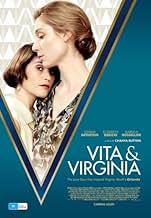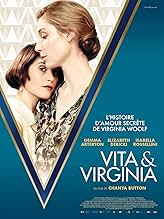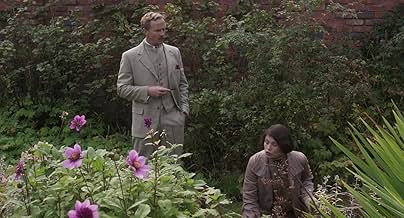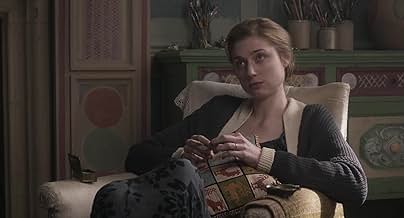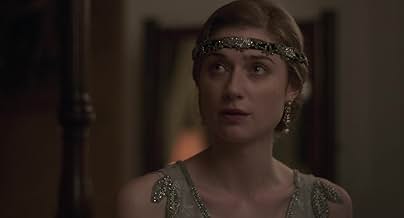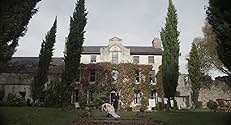VALUTAZIONE IMDb
5,9/10
5243
LA TUA VALUTAZIONE
L'affascinante storia d'amore tra la mondana e la popolare autrice Vita Sackville-West e l'icona letteraria Virginia Woolf.L'affascinante storia d'amore tra la mondana e la popolare autrice Vita Sackville-West e l'icona letteraria Virginia Woolf.L'affascinante storia d'amore tra la mondana e la popolare autrice Vita Sackville-West e l'icona letteraria Virginia Woolf.
- Regia
- Sceneggiatura
- Star
- Premi
- 1 vittoria e 2 candidature totali
Recensioni in evidenza
While the production can't be faltered, and even Virginia Woolf is impersonated quite well, there is a dramatic hole to this which is common with biographical films.
The events and the nature of the people should be more involving, more genuinely dramatic, and yet it is like the reflective scenes from a Chekhov play; somber and infected with a sense of its own importance. It doesn't make the time vivid, so much as refract the events through a literary effort. The result is tedious which is not helped by the intellectual mannerisms.
A good example here is the dullness of the Woolf circle as portrayed whereas in real life they were lively, highly sexual and amusing, amusing to the point of exhaustion. In this film they are dour; sure, we are told they are all licentious and amoral, but what we see on screen is not that.
Woolf was wickedly funny and witty. Sackville-West was verbally dexterous too. It's absent here. They are earnest and plain, and Woolf would not have tolerated that.
The outcome of this love affair is the book, 'Orlando', which if someone hasn't read it, seems a curious object. This, in a way, says much about the film, in that it is a paean to a much adored book.
Novelists, and the business of writing, are not always a success in films. Painters and musicians do better because they are more social arts, but the thrill of writing and words are, paradoxically, not easy to transmit.
The book which emerged from the affair has some prestige, though, for its ardent fans, it's best to avoid Nabokov's assessment of it: he described Orlando as pretentious, bourgeois, nonsense; a view in part, which has tended to loom over Woolf's entire body of work. Nabokov's insight may well apply to this film too. Well, Woolf was very sharp at criticism too.
The events and the nature of the people should be more involving, more genuinely dramatic, and yet it is like the reflective scenes from a Chekhov play; somber and infected with a sense of its own importance. It doesn't make the time vivid, so much as refract the events through a literary effort. The result is tedious which is not helped by the intellectual mannerisms.
A good example here is the dullness of the Woolf circle as portrayed whereas in real life they were lively, highly sexual and amusing, amusing to the point of exhaustion. In this film they are dour; sure, we are told they are all licentious and amoral, but what we see on screen is not that.
Woolf was wickedly funny and witty. Sackville-West was verbally dexterous too. It's absent here. They are earnest and plain, and Woolf would not have tolerated that.
The outcome of this love affair is the book, 'Orlando', which if someone hasn't read it, seems a curious object. This, in a way, says much about the film, in that it is a paean to a much adored book.
Novelists, and the business of writing, are not always a success in films. Painters and musicians do better because they are more social arts, but the thrill of writing and words are, paradoxically, not easy to transmit.
The book which emerged from the affair has some prestige, though, for its ardent fans, it's best to avoid Nabokov's assessment of it: he described Orlando as pretentious, bourgeois, nonsense; a view in part, which has tended to loom over Woolf's entire body of work. Nabokov's insight may well apply to this film too. Well, Woolf was very sharp at criticism too.
The characters speak in cryptic tongues, and I just don't understand the story. Everything else is beautiful from the sets to the costumes. Too bad I just cannot connect with the main characters at all.
2018 saw several historical dramas about lesbianism, including the fictitious "Tell It to the Bees" and three about real historical figures, even if doubts have sometimes been expressed about their historical accuracy. "The Favourite" dealt with the triangular relationship between Queen Anne, Sarah Churchill and Abigail Masham, and "Colette" told the story of the bisexual French novelist of that name. "Vita & Virginia" is about two more bisexual literary figures, Vita Sackville-West and Virginia Woolf.
As the story opens, in the England of the 1920s, Vita and Virginia are both well-known writers, but do not know each other personally because they move in different social circles. Vita is a politically and socially conservative aristocrat, whereas Virginia is part of the liberal, progressive Bloomsbury Group. Now that Virginia Woolf has become such a well-established part of the canon of English Literature ("From Beowulf to Virginia Woolf"), it seems strange to think that during their lifetimes it was Vita Sackville-West who was regarded as the more significant writer, both in terms of book sales and in terms of critical acclaim.
Vita, however, is fascinated by the other woman's work, and is determined to make her acquaintance. The two women, as portrayed here by Gemma Arterton and Elizabeth Debicki, are very different in personality. Debicki's Virginia is shy and retiring, and physically and mentally frail, whereas Arterton's Vita is outgoing, lively and magnetic. (Was Vita's vitality, I wonder, the reason for her nickname? She was officially baptised Victoria Mary, but was always known as Vita, Latin for "life"). When the two meet, however, they quickly become friends, despite their differences, and eventually lovers. Her relationship with Vita inspires Virginia's "Orlando", one of her best-known novels and her first major popular success.
One criticism that has been made is that Debicki is too young for the role of Virginia, and there is some justice in this. Virginia she was the older of the women by eight years, but Debicki is four years younger than Arterton. At least, however, she doesn't rely upon a false nose like Nicole Kidman did when playing Virginia in "The Hours".
Both women were married, and their husbands play important, if subsidiary, roles in this drama. Vita had a famously open marriage to the diplomat Harold Nicolson, who was himself bisexual and had relationships with other men. In the film he is depicted as having no objection to his wife's lesbian friendships, although he does wish she could be more discreet about them. (Her previous affair with Violet Trefusis caused a scandal which damaged his career). Virginia's publisher husband Leonard is not enthusiastic about her relationship but feels it is for the best if he tolerates it, given her fragile mental state.
Some may think that the film is too passionless, a presentation of a well-mannered, drawing-room form of lesbianism. Again, there might be some justice in this, although I suspect that such criticisms are most likely to come from those who expected, and hoped, that the film would be more sensual and erotic than it actually is. The film was never intended to be a piece of erotica, and I think that there are reasons why it is less passionate than one might expect. In the first place, it deals with events which took place nearly a hundred years ago, a period when the British still believed in the idea of the "stiff upper lip", far more than they do today. As a result people tended to behave in a more restrained manner, at least in public; open displays of strong feelings were discouraged. This was especially true when those feelings existed between two women; although lesbianism, unlike male homosexuality, was never illegal in Britain, it was still the subject of great social disapproval.
Secondly, in the version of events put forward here, Vita has had several earlier affairs with other women, whereas this is Virginia's first lesbian relationship. Debicki plays her not as a woman in the throes of a grand passion but as someone rather uncertainly exploring and discovering new aspects of her sexuality. The result is a film which is certainly restrained, but this seems appropriate to its period and to its subject-matter. It is, in fact, the restraint with which writer-director Chanya Button and her co-writer Eileen Atkins bring to their story which enables them to explore the psychology of their two main characters in such depth. 7/10
As the story opens, in the England of the 1920s, Vita and Virginia are both well-known writers, but do not know each other personally because they move in different social circles. Vita is a politically and socially conservative aristocrat, whereas Virginia is part of the liberal, progressive Bloomsbury Group. Now that Virginia Woolf has become such a well-established part of the canon of English Literature ("From Beowulf to Virginia Woolf"), it seems strange to think that during their lifetimes it was Vita Sackville-West who was regarded as the more significant writer, both in terms of book sales and in terms of critical acclaim.
Vita, however, is fascinated by the other woman's work, and is determined to make her acquaintance. The two women, as portrayed here by Gemma Arterton and Elizabeth Debicki, are very different in personality. Debicki's Virginia is shy and retiring, and physically and mentally frail, whereas Arterton's Vita is outgoing, lively and magnetic. (Was Vita's vitality, I wonder, the reason for her nickname? She was officially baptised Victoria Mary, but was always known as Vita, Latin for "life"). When the two meet, however, they quickly become friends, despite their differences, and eventually lovers. Her relationship with Vita inspires Virginia's "Orlando", one of her best-known novels and her first major popular success.
One criticism that has been made is that Debicki is too young for the role of Virginia, and there is some justice in this. Virginia she was the older of the women by eight years, but Debicki is four years younger than Arterton. At least, however, she doesn't rely upon a false nose like Nicole Kidman did when playing Virginia in "The Hours".
Both women were married, and their husbands play important, if subsidiary, roles in this drama. Vita had a famously open marriage to the diplomat Harold Nicolson, who was himself bisexual and had relationships with other men. In the film he is depicted as having no objection to his wife's lesbian friendships, although he does wish she could be more discreet about them. (Her previous affair with Violet Trefusis caused a scandal which damaged his career). Virginia's publisher husband Leonard is not enthusiastic about her relationship but feels it is for the best if he tolerates it, given her fragile mental state.
Some may think that the film is too passionless, a presentation of a well-mannered, drawing-room form of lesbianism. Again, there might be some justice in this, although I suspect that such criticisms are most likely to come from those who expected, and hoped, that the film would be more sensual and erotic than it actually is. The film was never intended to be a piece of erotica, and I think that there are reasons why it is less passionate than one might expect. In the first place, it deals with events which took place nearly a hundred years ago, a period when the British still believed in the idea of the "stiff upper lip", far more than they do today. As a result people tended to behave in a more restrained manner, at least in public; open displays of strong feelings were discouraged. This was especially true when those feelings existed between two women; although lesbianism, unlike male homosexuality, was never illegal in Britain, it was still the subject of great social disapproval.
Secondly, in the version of events put forward here, Vita has had several earlier affairs with other women, whereas this is Virginia's first lesbian relationship. Debicki plays her not as a woman in the throes of a grand passion but as someone rather uncertainly exploring and discovering new aspects of her sexuality. The result is a film which is certainly restrained, but this seems appropriate to its period and to its subject-matter. It is, in fact, the restraint with which writer-director Chanya Button and her co-writer Eileen Atkins bring to their story which enables them to explore the psychology of their two main characters in such depth. 7/10
The photography, the costumes, the sets, the hairstyles, ... it's truly a masterpiece! Otherwise, the film is excessively cold and intellectual, with an almost-platonic relationship between two female writers, Vita Sackville-West and Virginia Woolf, in the late 20's, in an exuberant aristocratic environment. From the beginning to the end, I was honestly outside the film, without ever being able to absorb the atmosphere, because of an almost-permanent boredom. Even the gorgeous Gemma Arterton has managed to make myself asleep. Literally incredible!
I have never in my life heard such a wrong music for a particular film. while the costumes, scenography and everything else is aiming to be realistic, historical, MUSIC is completely unrelated to any of that...it doesn't communicate in any way with the rest of the film. it makes it very hard to watch, creates distraction.
Lo sapevi?
- QuizBoth this film and the play on which it is based were derived from letters between Vita Sackville-West and acclaimed author Virginia Woolf.
- BlooperDriving in a convertible with the top down, neither woman has windblown hair.
- Citazioni
Harold Nicolson: I hear nothing but reports of her madness.
Vita Sackville-West: Madness, what a convenient way to explain away her genius.
- ConnessioniFeatured in London's Hollywood: Welcome to Pinewood (2006)
I più visti
Accedi per valutare e creare un elenco di titoli salvati per ottenere consigli personalizzati
- How long is Vita & Virginia?Powered by Alexa
Dettagli
- Data di uscita
- Paesi di origine
- Sito ufficiale
- Lingua
- Celebre anche come
- Віта і Вірджинія
- Luoghi delle riprese
- Aziende produttrici
- Vedi altri crediti dell’azienda su IMDbPro
Botteghino
- Lordo Stati Uniti e Canada
- 42.741 USD
- Fine settimana di apertura Stati Uniti e Canada
- 3408 USD
- 25 ago 2019
- Lordo in tutto il mondo
- 800.675 USD
- Tempo di esecuzione
- 1h 50min(110 min)
- Colore
- Proporzioni
- 1.85 : 1
Contribuisci a questa pagina
Suggerisci una modifica o aggiungi i contenuti mancanti

![Guarda Trailer [OV]](https://m.media-amazon.com/images/M/MV5BZDRkNTdiN2MtNzE4MC00NDU1LThjOTMtMTA0YzEyYmQwOThlXkEyXkFqcGdeQXRyYW5zY29kZS13b3JrZmxvdw@@._V1_QL75_UX500_CR0)






